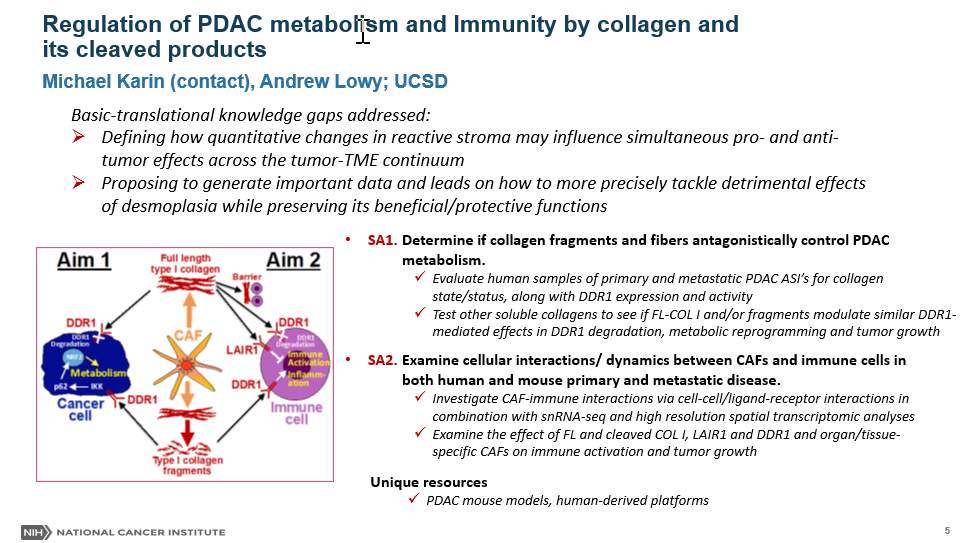Unlike many cancers, pancreatic ductal adenocarcinoma (PDAC) is characterized by a hypoxic, nutrient- deprived, immunosuppressive tumor microenvironment (TME) and a fibrotic stroma that may impair treatment response. Recent single-cell studies suggest a complex interplay between malignant tumor cells and other cell types within the TME, with crosstalk between tumor and stromal cell types influencing malignant cell phenotypes, including responses to therapy. Understanding these interactions will provide insight into PDAC progression and therapy resistance. In particular, cancer-associated fibroblasts (CAFs) are a major non-immune cell component of the TME and are comprised of several distinct subtypes that vary based on tumor subtype and the surrounding microenvironmental niche. In this proposal, we bring together a multidisciplinary team of basic and translational investigators that will build upon our prior studies to investigate the Tumor-TME co-organizer model with a focus on interrogating interactions between PDAC tumor cells and CAFs in the TME. Specifically, we will examine the overarching hypothesis that reciprocal signaling between tumor cells and CAFs shapes malignant cell and CAF phenotypes in a context-specific manner that can be modulated by prior therapy and the organ-specific niche. We will leverage multiple built-in capabilities, including genetically engineered mouse models (GEMMs), patient- derived organoid (PDO) and matched fibroblast models, functional genetic screens and clinical trials with serial biopsies to study the PDAC TME continuum in disease progression and resistance to therapy. Specifically, we propose (1) to determine whether targeting organ-specific PDAC-CAF interactions enhances therapeutic responses, (2) to interrogate novel vulnerabilities resulting from tumor cell and CAF reprogramming during PDAC therapy, and (3) investigate whether TGFB blockade disrupts tumor cell-CAF crosstalk and sensitizes PDAC to chemotherapy. In pursuing these studies, we will work with other members of the PDAC Stromal Reprogramming Consortium (PSRC) to pursue collaborative studies to understand how PDAC and TME interactions program tumor progression and therapy responses. For more information click here


Dr Karin started his career by studying and elucidating the JNK-AP-1 and IKK-NF-kB signaling pathways. This sparked his interest in the role of inflammation in metabolic disorders and cancers. Karin’s work had led the foundation to the thriving inflammation and cancer field. Continuing with the theme of inflammation and cancer, the Karin lab studied inflammation effects on collagen metabolism and elucidated how the state of type I collagen in the PDAC TME controls cancer metabolism , growth, response to therapy and patient survival.

Dr. Lowy holds the Levine Family Chancellor’s Distinguished Chair in Surgical Oncology and is Professor of Surgery, Director of Surgical Oncology and Associate Director of Moores Cancer Center at UC San Diego Health. He is a physician-scientist whose clinical and research primarily focuses on identifying and testing novel therapies for pancreatic and appendiceal cancer. His laboratory co-developed the first mouse model of human pancreatic cancer which has become the standard in the field, has been licensed to pharma and used by hundreds of labs worldwide. The laboratory focuses on novel target identification, preclinical modeling and experimental therapeutics. Dr. Lowy’s research has led to the development and testing of novel therapies which have reached the clinic most recently a tumor penetrating peptide which is being tested in randomized Phase 2 trials. Dr. Lowy has served in a number of national leadership roles including the NCI Clinical Trials and Translational Research Committee which advised on development of pancreatic cancer research priorities for the Recalcitrant Cancers Act, serving as vice-chair of the NCI Pancreatic Cancer Task Force, and chair from 2016-2021. He has served as co-leader of the SWOG pancreas cancer subcommittee since 2007. Dr. Lowy serves on the NCCN pancreatic cancer guidelines panel and on advisory boards for PANCAN, The Lustgarten Foundation, PANKIND, and The National Pancreas Foundation. Most recently, Dr. Lowy co-led the creation of the University of California Pancreatic Cancer Consortium.

Dr. Schwabe is a Professor of Medicine and the Director of the Digestive and Liver Disease Research Center at Columbia University. Dr. Schwabe’s lab is interested in the role of extracellular matrix (ECM) in the development, progression and therapy of cancer. With a primary focus on the liver, the Schwabe lab has investigated the role of cancer-associated fibroblasts and type I collagen on PDAC liver metastasis. Interestingly, deletion of type I collagen promoted the growth of PDAC liver metastasis, suggesting a tumor-restricting role. Current studies are focusing on the role of type I collagen and collagen receptors on tumor and immune cell responses in PDAC liver metastasis and further development of ECM-based therapeutic concepts.

Dr. Hosseini-Varnamkhasti graduated from the Oregon Health & Science University School of Medicine in 2009. She works in San Francisco, CA and 2 other locations and specializes in Pathology. Dr. Hosseini-Varnamkhasti is affiliated with University California San Diego Medical Center.